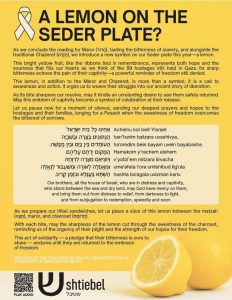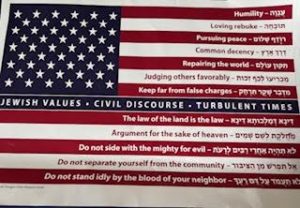This was not the Passover we dreamed of or planned for six months. It was in fact Passover. Here are my reflections from the day after being released from a 0 pressure room measuring 9×12.
We had set out to do a Community Seder with a theme of Passover Around the World. We have members that come from 17 foreign countries (don’t make me name them all!), it would be more interactive than some, and it would interest the children in such a way to sit up, take notice and ask “Why?” Why is this night different? Why are we doing this? It is a way to tell the story.
Then we welcomed Beth Tikvah Congregation and I enjoyed working with Cantorial Ilana Axel to plan what we hoped would be a meaningful and joyous celebration. And the music would be great too.
We ordered a new-to-the congregation Haggadah that would be both modern and ancient, contain the traditional elements and enough transliteration to make it accessible to all—young and old. We planned an international menu and ordered international, kosher for Passover wines from the Men’s Club wine sale. I did most of the shopping, running into many (male) rabbis shopping for their community seders. The tables were set. They were beautiful. We learned that in Hungry and Austria people decorated the tables with jewelry because the Israelite women did not give up their gold for the golden calf. My daughter and I had started cooking. Hard boiled eggs, matzah ball soup, Asparagus Nicoise (recipe to follow).
We went home to take a break and to “sell” the remaining chametz. Sarah did not like the looks of a rash, that the day before we all thought (including the docs) was contact dermatitis. We called my physicians. One made a 4PM Friday afternoon appointment available. The next thing I knew I was being sent to Advocate Lutheran General. We cancelled Friday night services on the way to the hospital. OY.
As it turns out I had disseminated shingles. I could write volumes on that alone. For five days I was in a zero pressure room at the hospital that was 9×12. There are people who are really prisoners, who are really hostages, captives, slaves. One of the most powerful seders I have ever conducted was at Elgin Mental Health (a forensic jail essentially) with an inmate who was a PhD candidate at the University of Chicago in political science but who had “snapped.” We had both read Exodus and Revolution prior to the seder. (Worth the read everyone! Especially in these times.) But at the end of that seder, I walked out of that jail. He did not, although he eventually was able to.
I get though a lot of life on my humor. It isn’t always easy. But there is an important truth to Passover. Each of us is to see ourselves as if we ourselves were rescued, redeemed, out of Egypt, out of the narrow places. This was my narrow place. How was I going to celebrate? How was I going to get out. The truth lay in the room service menu and a zoom link! That zoom view enabled me to have two intensely spiritual moments. 1. We did it. We got 85 people in the room to celebrate Passover. Wow! Even without me. The congregation really pulled together and made it happen. It was a powerful moment for me—and I hope for them. 2. The shehechianu prayer which praises G-d for keeping us alive and sustaining us and enabling us to reach this moment has always been powerful. There have been times when it wasn’t clear that I or a loved one or even the world would be here. And yet, for now at least, I am. Hineini. I cried. I let the tears flow. Really. Those of you who know me well know I don’t cry often.
So the menu—i ordered what I could so I could follow along. It is true that Lutheran General has a kosher cabinet. And I am told that there were kosher for Passover tv dinners but no one knew where. They did know that there was matzah. So I ordered:
- Matzah
- Egg and salt
- Grape juice
- Apple sauce and raisins (think charoset)
- A fruit plate (it had parsley, arugula and romaine)
- And an orange—of course I would find an orange.
So it is possible, with a little creativity to celebrate Passover anywhere. On a mountain top. At a synagogue. In a home. In a concentration camp or a tunnel. And yes, even in a 9×12 isolation room. It was amazing to follow along (at least until their dinner). And amazing the next night at the house, where I could participate as well—mostly. The discussion was excellent. This all brings me hope.
All I can say to all who stepped up—thank you.
I had written out a script to go with our new haggadah. What follows is an edited version:
Passover is both ancient and modern. It is a layered telling of a historical event. In order to help prepare you for the Community Seder this weekend. We won’t be using all of them.
As we begin the seder singing the song of the order of the seder we use an ancient Babylonian melody that Ilana will lead.
In Turkey, as part of the Maggid, the doorbell may ring, and someone dressed in Middle Eastern garb enters. The dialogue may be, “Where are you coming from?” And the answer is “From the land of Egypt.” And where are you going? To the land of Israel. Cheers may erupt. Let’s see what happens.
Jews in Tunisia do not use a seder plate; instead, the ritual foods that are otherwise found on a seder plate are placed into a reed basket, to remind us of Moses being placed in a basket as an infant. The matriarch of the house then takes the reed basket and hovers it over each guest’s head. The matriarch says, “We left Egypt.” The guest replies, “Yesterday, we were slaves. Today, we are free. This year, we are here. Next year, we will be free people in the land of Israel.”
For Karpas, the green leafy hint of spring, dipped in salt water, we will use the parsley that the Torah School grew plus some Italian flat leaf parsley. In Ukraine, they use a potato. That is what was available.
When we break the middle matzah for Yachatz, there are many traditions. Does the leader hide it? Do the kids? Let all who are hungry come and eat. We sing Halachma, written in Aramaic..
In India, for the Four Questions, the kid would hold the seder plate while asking the questions. The 3 matzahs would represent the Kohanim, Leviim and the Israelites and would be marked with 1 2 or 3 lines. Maybe with a sharpie? And there would be 12 pieces of matzah, one for each of the 12 tribes. In Mumbai, India, Jews mimic the Passover lamb’s blood that was smeared across the entrances to Israelite homes in Egypt on the eve of their liberation. The Indian Jews would dip their hands in the blood of a sheep or goat. Then, they press their hands to blank pieces of paper and hang the prints above their doorway. The imprint resembles a hamsa and like the amulet, and symbolizes good luck and protection. Our Torah School kids did this project, not with actual blood but with red paint as a banner we hung over the door.
In Israel, on a kibbutz, the seder is more like a school play that the kids rehearse. And there is a difference in the Four Questions:
Why is this night from all other nights?
On all other nights we eat either chamtz or matzah
On this night we eat only matzah.
On all other night we eat sitting or reclining
Tonight we all recline.
On all other nights we eat a quick meal
Tonight, the meal is longer and it’s a night for staying awake.
On all other nights we talk about things in general
On this night we talk about the exodus from Egypt.
Jewish communities in Morocco recite a similar dialogue; however, Moroccan Jews use a seder plate rather than a reed basket.
In Iran and Afghanistan, just before Dayenu, they use scallions to actually whip people sitting next to them as though they were slaves. before Dayenu.
There are many different charoset recipes, each reflecting Jews around the world. As part of the appetizers, please enjoy the different tastes. Some say that the “recipe” for charoset comes from Song of Songs, which is read on Passover. A booklet of international recipes will be distributed to you for your dining pleasure next year, as your seder favor.
What else is on the seder plate. Orange, olives. A beet. Sometimes we add a coffee bean or chocolate.
This year we add a lemon to remember the hostages, still held in captivity..
So tonight, we have talked about traditions in 12 countries and tasted the food or wine of six more. We hope that this has enriched your celebration and help to make you feel connected to Jews throughout the United States and around the world. Next year in Jerusalem. Next year all the world redeemed.
Asparagus Nicoise Recipe
2 pounds asparagus, trimmed
2 Tbl. red wine vinegar
2 tsp. Dijon mustard (I omit some year)
2⁄3 cup olive oil
2 shallots minced (or green onion)
2 plum tomatoes, diced
1⁄3 cup Niçoise olive, diced (Or canned Israeli)
1 Tbl. drained capers (harder to find for Passover)
Cook asparagus in large pot of boiling water until just tender, about five minutes. Drain. Transfer to serving platter.
Whisk vinegar and mustard in small bowl. Gradually whisk in oil. Mix in shallots, tomatoes, olives and capers.
Season to taste with salt and pepper.
Pour over asparagus and serve. Can be served chilled, room temperature or hot.
Margaret Frisch Klein from Nelle S. Frisch from an old Bon Appetit.

